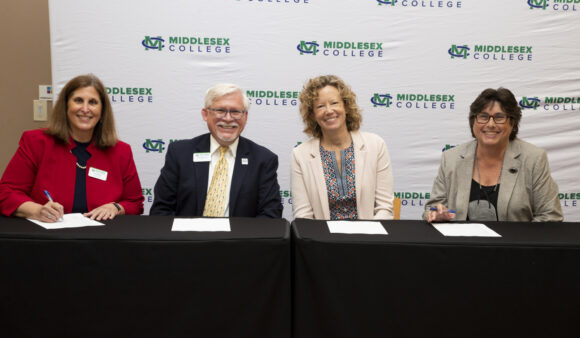
Rutgers and Middlesex College adminstrators, From left: Linda Scherr, vice president for academic affairs at Middlesex College; President Mark McCormick; Laura Lawson, executive dean, Rutgers School of Environmental and Biological Sciences; and Mary-Pat Maciolek, chair of the Middlesex College Department of Hospitality, Culinary Arts and Dietetics.
Transferring to Rutgers University–New Brunswick just got even easier for Middlesex College dietetics students, thanks to a new articulation agreement between the college’s Hospitality, Culinary Arts and Dietetics Department and Rutgers’ Department of Nutritional Sciences, which is in the School of Environmental and Biological Sciences (SEBS).
Under the agreement announced Wednesday, June 22, students who graduate from Middlesex College with an associate of science in dietetics can continue their studies toward a bachelor degree in nutritional sciences in the Didactic Program in Dietetics (DPD) at Rutgers.
The agreement is effective June 1 through May 31, 2027, and will be reviewed and updated every five years.
Middlesex and Rutgers representatives were at the Middlesex College campus in Edison, N.J., to formally make the announcement.
“Middlesex College has a long history of collaboration with Rutgers University and is proud to be the largest sender of transfer students to Rutgers,” said Mark McCormick, president of Middlesex College. “This new agreement provides students who begin their college journey at Middlesex College by earning an Associate Degree with another seamless pathway to earning a Bachelor’s Degree from Rutgers.”
Francine Conway, chancellor-provost of Rutgers University–New Brunswick, said the agreement benefits both institutions and their students.
“Rutgers–New Brunswick is creating streamlined entryways for qualified transfer students as part of the commitment to student success enshrined in our new Academic Master Plan,” she said. “We are grateful to Middlesex College for this partnership, which makes the benefits of higher education even more accessible.”
To be admitted to Rutgers’ SEBS, graduates of the Middlesex College’s dietetics program must have a minimum cumulative grade point average of 3.0 or higher. For all major courses transferring to SEBS, the student must have achieved a grade of C or better.
At SEBS, 120 credits are needed to obtain a bachelor of science degree in nutritional sciences – dietetics option. Under the agreement, Middlesex College students completing the associate of science degree in dietetics transfer will be allowed to transfer up to 60 credits toward a bachelor of science degree in nutritional science – dietetics option, allowing them to complete their degree and obtain their DPD verification statement at Rutgers in just two additional years of full-time study. Graduates of the DPD program are prepared to complete the requirements for the Registered Dietitian/Nutritionist (RDN) credential.
“We appreciate how well-prepared students from Middlesex College are for advanced study at Rutgers and look forward to welcoming them,” said Carol Byrd-Bredbenner, distinguished professor and director of the Rutgers Nutritional Sciences Graduate Program. “We have an important role in preparing the next generation of professionals who work to protect the nutritional health of all New Jersey residents.”
Mary-Pat Maciolek, professor and chair of the Hospitality, Culinary Arts and Dietetics Department at Middlesex College, said increasing demand for dietitians across a broad swath of industries, underscoring the impact the new agreement will have for graduates in this field.
“According to the Bureau of Labor Statistics, the job outlook for the Registered Dietitian Nutritionist/RDN is expected to grow faster than the average for all occupations,” she said. “This articulation agreement provides a viable pathway for Middlesex College students interested in a career that is focused on improving the public’s health and nutrition. There are countless opportunities in the dietetics profession: health care, food-service management, sports, research, education, business and industry. This agreement opens the door to an amazing career.”

